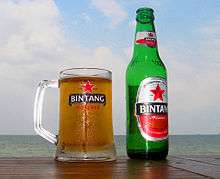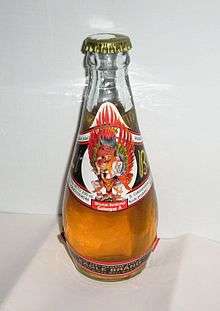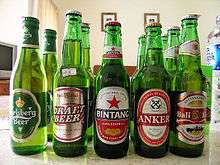Alcohol in Indonesia

Alcohol in Indonesia refers to alcohol industry, alcohol consumption and laws related to alcohol in South East Asian country Indonesia. Indonesia is a Muslim majority country, yet it is also a pluralist, democratic and secular nation.[1] This social and demographic condition led to Islamic parties and pressure groups to push the government to restrict alcohol consumption and trade, while the government carefully considers the rights of non-Muslims and common consenting adult to consume alcohol, and estimates the possible alcohol ban effects on Indonesian tourism and economy.[2]
Currently, there are no nationwide alcohol bans being enforced in Indonesia, with the exception of Aceh, a stern Islamist autonomous province which apply sharia laws including the complete ban of alcohol. Since 2014, anyone found consuming alcohol or breaching the codes on moral conduct, whether residents or visitors to Aceh, could face between six and nine cane lashes.[3] In other parts of Indonesia, to appease the Islamic parties and pressure groups, the government agreed to apply mild restriction measures on alcohol, which includes high taxation and limited ban. Indonesia is among the countries that apply high tax on imported alcoholic beverages; in 2015, import tax on alcohol jumped to 150%.[4] Also in 2015, the Indonesian government banned the sale of alcohol from minimarkets and small shops, with the exception of Bali province, though sale was allowed in supermarkets, restaurants, bars, clubs and hotels.[5] Nevertheless, in more cosmopolitan Indonesian cities like Jakarta, Medan and Surabaya, and also in tourism hotspots such as Bali, Yogyakarta and Batam, alcohol beverages are readily available, yet with higher prices, owing to the high tax applied upon alcoholic beverages.[6]
In February 2016, Indonesian Malt Beverage Producers Association (GIMMI) called the House of Representatives to draft for comprehensive regulations on the chain of production and the marketing of alcoholic beverages, instead of total prohibition.[7]
History and traditions

Since ancient times, local alcoholic beverages were developed by the natives in the archipelago. Some panels in 9th century Borobudur bas-reliefs depicted drink vendor, warung (small restaurant), and there is a panel depicting a building with people drinking (possibly alcoholic beverage), dancing and having fun, seems to describe tavern or lodging. According to a Chinese source, Yingyai Shenglan (c. 15th century) people of Java in Majapahit kingdom drank wine made from palm sap called tuak (palm wine).[8] However, by 16th century Islam began to supplant Hinduism and Buddhism as the major religion in Indonesia. Since then, as a Muslim-majority country, Indonesian Muslims share Islamic dietary laws that prohibit alcoholic beverages. Nevertheless, the local alcohol drinking culture still survives, at least among less-religious members of society and among non-Muslim community.[9] Certain ethno-cultural regions which are predominantly Christian are known for their affinity to alcohol-drinking tradition; they are Batak, Torajan, Minahasan and Ambonese.
Indonesia has its own traditional alcoholic beverages prepared by fermenting rice grain, gluten, sugar palm sap, coconuts etc. According to culinary expert William Wongso, culture of drinking distilled alcohol was never strong in Indonesia, only few regions have developed it.[10]
In Batak community in North Sumatra, tuak (palm liquor) is a compulsory drink in the celebrations and became a tradition in the community. Batak tribes are predominantly of Christian Protestant faith, yet some of its clans are Muslims. A traditional Batak bar serving tuak is called lapo tuak.[11]
In Toraja lands of South Sulawesi, their version of tuak — made from fermented sugar palm sap, is called ballo.[12] In any Torajan traditional ceremonies, rituals and celebrations, ballo is always served, either as a prerequisite for the ritual; as an offering for ancestral spirits, as well as for drinks for the guests. Ballo is also commonly consumed by the neighboring Bugis ethnic group.[13]
In Minahasa region of North Sulawesi, an almost identical palm liquor also made from sugar palm sap is called saguer.[14] In Nusa Tenggara and Maluku Islands the people also drink palm wine, locally known as sopi.[10]
Also in Minahasa region, the people drink a highly alcoholic drink called cap tikus (lit. "rodent brand"). Cap tikus is made from distilled saguer or sopi (palm wine), which increases its alcohol content. The origin of cap tikus brand is unclear. It is suggested that circa 1820s, prior to 1830 Java War, the KNIL Minahasan legion found and bought distilled saguer or sopi sold in blue bottles embossed with the image of mouse sold by a Chinese merchant in Fort Amsterdam in Manado.[14] Today however, because of poor regulation on alcohol production in this region, this traditional home-made cap tikus industry is considered as an illegal beverage, due to high accident of mortal alcohol poisoning.[15]

Bottled brem bali (Balinese rice wine) and arrack are popular beverages in Hindu-majority island of Bali. Brem is a brownish coloured liquor with a 5% alcohol. It is also exported to Japan and China. For Balinese people it has a religious significance too. Brem, arak and tuak are the required things for tabuhan (offering) to the gods.[16]
In Solo, Central Java, ciu, a local adaptation of Chinese wine, made from cider molasses of sugarcane is well known. It is linked to Solo's history as sugar plantation and production center in colonial times.[17]
The Dutch Colonial state was established in Indonesia in 1800s. The colonial Dutch brought with them European drinking culture to East Indies, most prominently beer. The Heineken beer company established its brewery factory in Surabaya in 1929 during Dutch colonial rule of Indonesia.[18] By 1960s, Indonesians developed their own local brands of beer, which includes Bintang Beer (nationalized from Heineken) and Anker Beer.[19]
Regulation
A Presidential regulation signed by Susilo Bambang Yudhoyono in 2013 gave legal cover to distribution of alcohol, it classified alcoholic beverages in Indonesia in 3 categories. Drinks having alcoholic percentage less than 5% (A class), 5%–20% (B class) and more than 20% (C class). It was replacement of the 1997 decree after Supreme Court abolished it after appeals of religious groups like Islamic Defenders Front. 2012 court ruling was came after draft bill proposed by United Development Party (PPP) to completely ban sale, production and consumption of alcohol in Indonesia. However, 2013 presidential regulation was welcomed by travel agencies in wake of harmful effects of proposed draft of PPP on tourism.[20][21]
Prices of the wine and spirits in Indonesia was increased by 140.5% and 154.4% respectively during 2009–2014. In 2015 government further hiked import tariff on wine and spirits which will nearly double the prices of alcoholic beverages.[22]
Industry and products

Foreign companies which sell alcohol in Indonesia are Diageo, Pernod Ricard, Remy Cointreau and Bacardi.[22] PT Multi Bintang is the largest domestic brewery of Indonesia.[23] As per market experts, because of various regulations, alcohol sales are declining in Indonesia.[24]
Bintang Beer of Multi Bintang brewery is the largest selling beer of Indonesia. Multi Bintang is a subsidiary of Heineken Asia Pacific. In 2011, Bintang Beer won the Gold Medal for Lager Beer Category and awarded 'Champion Beer 2011' at the world's class beer competition, the Brewing Industry International Award (BIIA 2011) in London. In 2014 Bintang Radler was introduced which was the first flavoured beer produced domestically in Indonesia.[24][25][26][27] Other major beer producers are Delta Djakarta known for its Anker Beer,[28] and PT Bali Hai Brewery Indonesia known for its Bali Hai, an affiliate to an Asian brewery, which also produced under license other brands including San Miguel Beer, Asahi beer and Lowenbrau beer (non alcoholic).[29]
In 2012, "Drum Green Label" whisky of Astidama Distillery won Gold Medal in Spirit International Prestige (SIP) Awards held in the USA. It became first whiskey from Indonesia to get international recognition.[30]
Illegal alcohol
The high prices of alcohol drinks in Indonesia, caused by high taxation and restriction, has led to the rampant case of illegal alcohol in the country. As the legal and imported alcoholic beverages become unaffordable, locals turns to illegal bootlegged alcohol for cheaper binge. These illegal alcoholic drinks are known in Indonesian as alkohol oplosan (lit. "solved alcohol").[7] These illicitly produced liquor which are traditionally home-made, are considered illegal in Indonesian law, due to high incident of deadly alcohol poisoning. The lapen liquor from Yogyakarta for example, is made from industrial alcohol of 85% mixed with water with 1:4 or 5 alcohol to water ratio; then mixed with fruit essence as flavouring agent.[31]
In February 2010, 16 people died and 5 lapen sellers were arrested in Yogyakarta, due to alcohol poisoning and illicit alcohol production crime.[32] In September 2010, three Russian Sukhoi fighter technicians died in Makassar caused by methanol poisoning in their drinks.[33] Other traditionally made alcoholic spirits such as Solo's ciu, Manado's cap tikus, and some Balinese arrack are known as illegal alcohol, also due to high incident of alcohol poisoning.
See also
References
- ↑ Cochrane, Joe (7 October 2009). "Why Indonesia Is Not a Muslim Democracy". Newsweek. Retrieved 5 November 2015.
- ↑ Dewanti A. Wardhani; Ni Komang Erviani; Panca Nugraha (9 August 2016). "Alcohol ban jeopardizes industry, tourism". The Jakarta Post.
- ↑ Hotli Simanjuntak; Ina Parlina (7 February 2014). "Aceh fully enforces sharia". The Jakarta Post. Retrieved 6 November 2015.
- ↑ "Import tax on alcohol jumps to 150%". The Jakarta Post. 23 July 2015.
- ↑ "Indonesia bans alcohol sales in small shops – BBC News". Bbc.com. 2015-04-16. Retrieved 2015-11-05.
- ↑ "Bali tourist areas exempt from beer ban". The Jakarta Post. 2015-04-17. Retrieved 2015-11-05.
- 1 2 "Liquor should not be banned, but controlled: Industry". The Jakarta Post. 11 February 2016.
- ↑ Ma Huan; JVG Mills (1970). "Ying-yai Sheng-lan, The Overall Survey of the Ocean's Shores" (PDF). Washington.edu. pp. 86–97 (Country of Chao–Wa).
- ↑ Graham Saunders (28 September 2010). Indonesia – Culture Smart!: The Essential Guide to Customs & Culture. Kuperard. pp. 55–. ISBN 978-1-85733-588-0.
- 1 2 Andreas D. Arditya (14 April 2013). "A taste for spirits". The Jakarta Post. Retrieved 5 November 2015.
- ↑ Wan Ulfa Nur Zuhra (21 January 2013). "Enjoying 'tuak' in Batak country". The Jakarta Post. Retrieved 5 November 2015.
- ↑ "SYL Minum "Ballo" Khas Toraja". Tribun Timur (in Indonesian). 27 December 2014. Retrieved 6 November 2015.
- ↑ Indra J Mae (10 February 2012). "Minuman Alkohol Tradisional Sulawesi Selatan". Kabar Kami.com (in Indonesian). Retrieved 6 November 2015.
- 1 2 Indra J Mae (4 April 2015). "Sejarah Alkohol Khas Minahasa, Cap Tikus". Kabar Kami.com (in Indonesian). Retrieved 6 November 2015.
- ↑ "Cap Tikus". Tribun News (in Indonesian).
- ↑ Harry Nazarudin (26 January 2013). "Making 'brem' and 'arak' in Bali". The Jakarta Post. Retrieved 5 November 2015.
- ↑ Ahmad Rafiq (18 January 2014). "Ciu, Minuman Keras Legendaris dari Bekonang". Tempo (in Indonesian). Retrieved 2015-11-05.
- ↑ "The history of Heineken" (PDF). Retrieved 2011-05-12.
- ↑ Giras Pasopati, CNN Indonesia. "Dilarang di Minimarket, Saham Bir Bintang dan Anker Meriang". Cnnindonesia.com. Retrieved 2015-11-05.
- ↑ "New Presidential Regulation on Alcohol in Place; Controversy Remains | Jakarta Globe". Jakartaglobe.beritasatu.com. Retrieved 2015-11-05.
- ↑ "One More Round on Indonesian Alcohol Rules". Amcham.or.id. 2014-02-13. Retrieved 2015-11-05.
- 1 2 Reuters Editorial (2015-08-10). "Indonesian alcohol market faces price headache after tariff hike". Reuters. Retrieved 2015-11-05.
- ↑ "Issue of the day: Bill terrifies alcohol industry". The Jakarta Post. 2015-09-03. Retrieved 2015-11-05.
- 1 2 "Beer in Indonesia". Euromonitor.com. Retrieved 2015-11-05.
- ↑ "Welcome to the International Brewing Awards, incorporating The International Cider Awards". Brewing Awards. Retrieved 2015-11-05.
- ↑ Category: Branding & Retail. "Pack Web Asia – APB completes acquisition of Indonesia's Bintang Beer". Dev2.packwebasia.com. Retrieved 2015-11-05.
- ↑ "8 of the Best Beers in Southeast Asia". Goseasia.about.com. Retrieved 2015-11-05.
- ↑ Delta Djakarta Tbk PT. "DLTA:Indonesia Stock Quote – Delta Djakarta Tbk PT – Bloomberg Markets". Bloomberg.com. Retrieved 2015-11-05.
- ↑ "Company: About us". Bali Hai Brewery.
- ↑ "The First Indonesian Whisky Achieved International Recognition – TABANAN, Indonesia, Oct. 1, 2012 /PRNewswire/". Prnewswire.com. Retrieved 2015-11-05.
- ↑ Anang Zakaria (18 January 2014). "'Lapen' Oplosan Alkohol dan Air dari Yogya". Tempo.co (in Indonesian). Retrieved 5 November 2015.
- ↑ Abi (14 February 2010). "16 Orang Tewas, 5 Penjual Lapen Ditahan". Kompas.com (in Indonesian). Retrieved 5 November 2015.
- ↑ Ita Lismawati; F. Malau; Rahmat Zeena (17 September 2010). "Tiga Tewas, Rusia Kirim Teknisi Sukhoi Baru". Viva.co.id (in Indonesian). Retrieved 5 November 2015.
| Wikimedia Commons has media related to Alcoholic beverages from Indonesia. |
